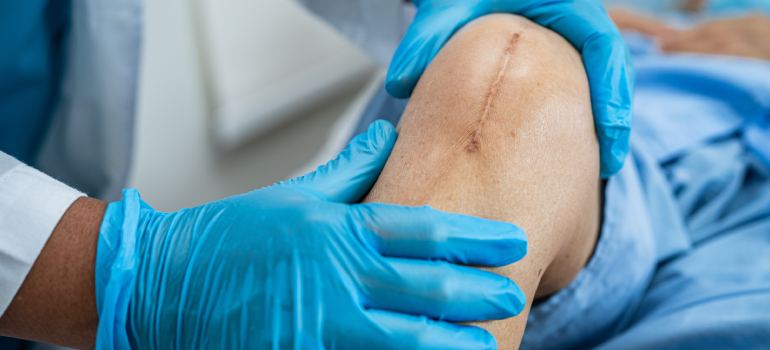You may consider knee replacement surgery a therapy option if you have chronic knee pain and limited mobility. With the replacement of broken bone and cartilage with an artificial joint consisting of metal and plastic, this operation aims to reduce discomfort and increase mobility. As with any procedure, there are crucial aspects to take into account before deciding whether to have the treatment done. This article will go over the top five things you should know about knee replacement surgery, including the types of available procedures, how to get ready for the procedure, and what to expect from the healing and rehabilitation processes.
Who is a candidate for knee replacement surgery?
Knee replacement surgery is typically recommended for people with severe knee pain and disability that is not relieved by other treatments, such as medication, physical therapy, or injections. Candidates for knee replacement surgery should have tried other treatments without success and be in good health. Your healthcare provider will assess your medical history and perform a physical exam to determine if you are a candidate for knee replacement surgery.
What happens during knee replacement surgery?
During knee replacement surgery, the damaged cartilage and bone in your knee joint are removed and replaced with an artificial joint made of metal and plastic components. The surgery is typically performed under general anaesthesia, which means you will be asleep during the procedure. Your healthcare provider will make an incision in the front or side of your knee and remove the damaged parts of your joint. The artificial joint will then be secured to your remaining bone with special cement or screws.
What is the recovery process like?
Following knee replacement surgery, you will need to stay in the hospital for a few days to recover and receive pain medication as necessary. After a few weeks, you’ll need to use crutches or a walker, and you’ll need to go to physical therapy sessions to help your knee regain strength and movement. It’s crucial to adhere to the post-operative care recommendations given by your healthcare professional, which may include strengthening exercises for your knee and blood clot prevention. Between six to twelve weeks of surgery, the majority of patients can resume daily activities, including walking and driving.
What are the potential risks and complications?
Knee replacement surgery has risks and potential complications, just like any surgical treatment. Infection, blood clots, nerve damage, stiffness, and persistent discomfort are a few of these. Nonetheless, the likelihood of serious side effects is minimal, and most patients who have knee replacement surgery report considerable reductions in pain and increased mobility.
What are the long-term outcomes of knee replacement surgery?
Most patients see a significant reduction in pain and movement following knee replacement surgery, which typically has excellent long-term results. The American Academy of Orthopaedic Surgeons reports that more than 90% of knee replacement surgery patients report improved knee function and decreased discomfort. The prosthetic joint’s lifespan, however, can differ based on age, weight, and level of exercise. After 10–20 years, the joint could need to be replaced once more in specific circumstances.
OrthoCure Clinic takes a comprehensive approach to address your pain and concerns along with those of your referring physician, offering cervical spondylitis treatment in Gurgaon. Our team of experienced orthopedists, physiotherapists, and chiropractors conducts a thorough evaluation to identify the underlying cause and provide an accurate diagnosis. We aim to alleviate the pain caused by bone and muscle illnesses and help you lead a better life. Contact us at +91 – 9821451214 for a FREE consultation.





